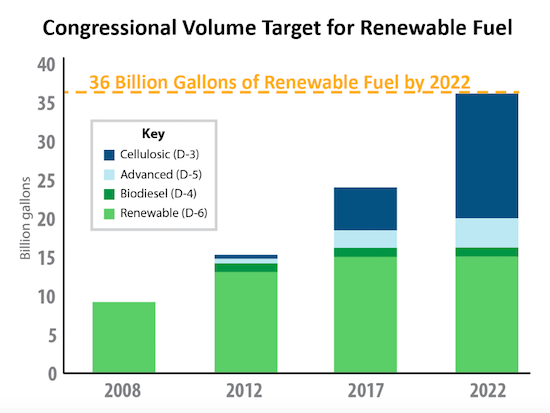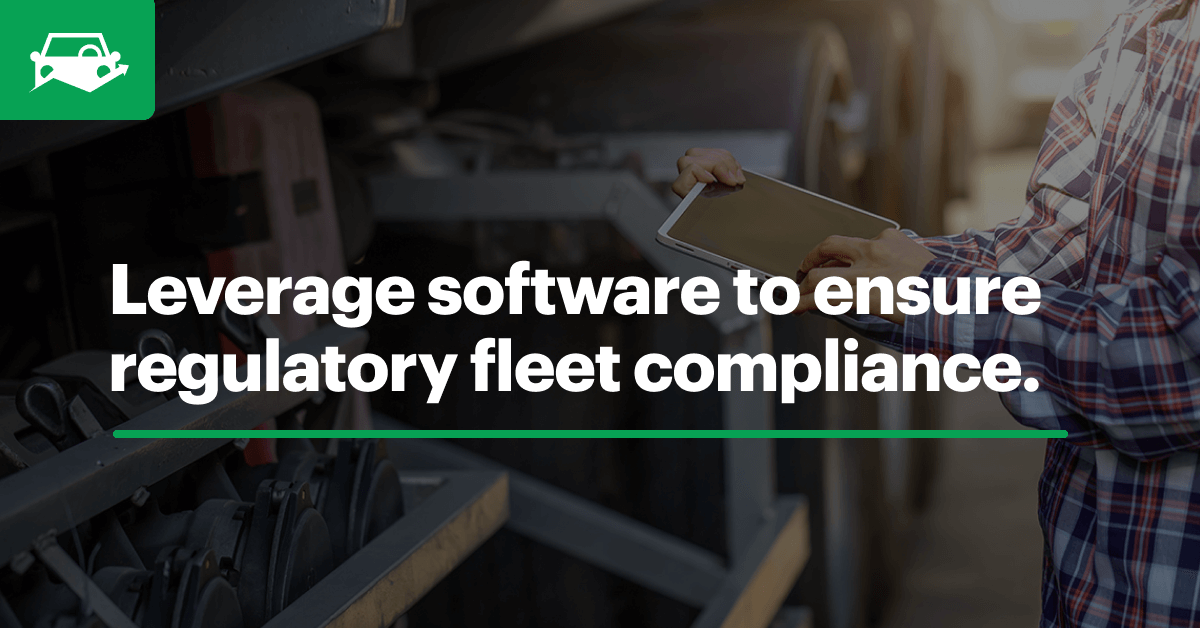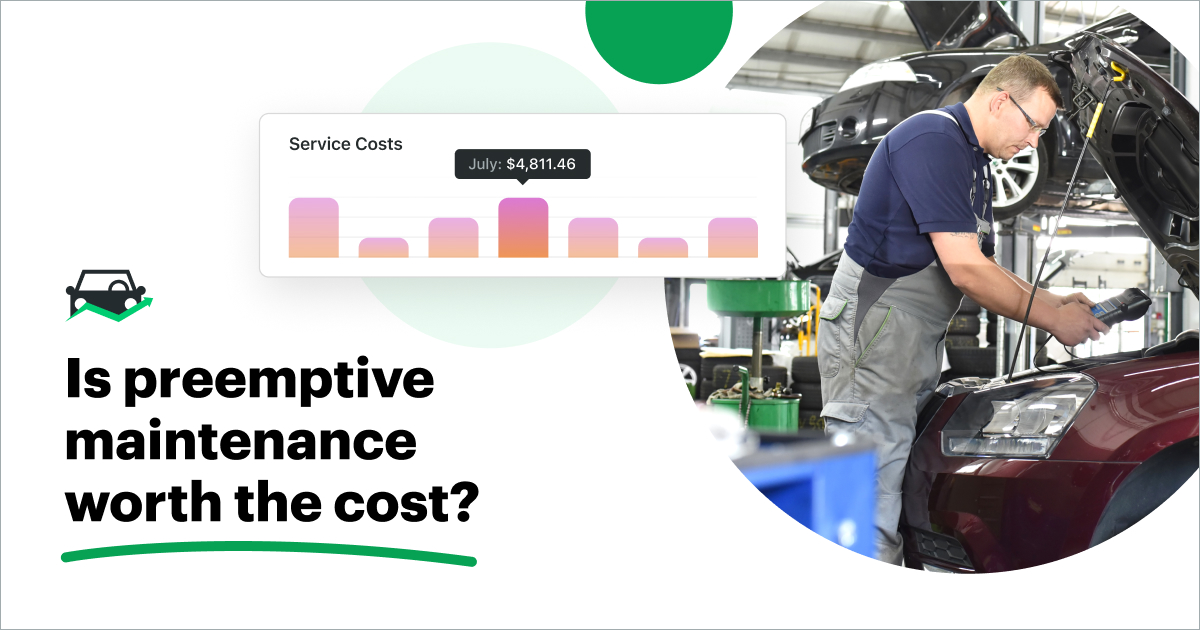Governmental policies on a local, state and federal level have been increasingly supportive of fleets adopting biodiesel fuels. Most new diesel vehicles are expected to be compatible with biodiesel and more fleets are switching to alternative fuels to be in compliance, save on fuel or reduce fleet emissions.

According to the National Truck Equipment Association (NTEA) 2018 Fleet Purchasing Outlook survey, 18 percent of fleet participants use biodiesel, up 3 percent from the year before.
Biodiesel regulations may pertain to your fleet now or in the near future, so make sure you’re aware of them to prepare or take advantage of the savings.
Federal Regulations
Energy Policy Act (EPACT)
EPACT was created to reduce U.S. petroleum consumption and increase domestic use of alternative fuels for covered state and alternative fuel provider fleets.
Covered fleets are state and alternative fuel provider fleets that own, operate or lease 50 or more non-excluded light-duty vehicles, operate at least 20 of those vehicles in one single Metropolitan Statistical Area (MSA) and are centrally fueled or are capable to be centrally fueled.
EPACT requires all covered fleets adhere to Standard Compliance or Alternative Compliance.
Standard Compliance permits:
- Acquisition of alternative fuel vehicles (AFV) or creditable non-AFVs electric vehicles (HEVs, PHEVs, FCEVs)
- Investment in alternative fuel infrastructure, non-road equipment or emerging technology
- Purchase of biodiesel
- Use or purchase of AFV credits
The National Biodiesel Board considers AFV credits the most economical option for fleets to meet Standard Compliance. One credit is earned for every equivalent purchase of 450 gallons of neat biodiesel (B100). Credits, however, cannot account for more than 50 percent of a fleet’s annual AFV acquisition requirements, except for biodiesel providers.
Fleets do not have to adhere to Standard Compliance if fleets receive a waiver with Alternative Compliance, which permits fleets to implement an alternative plan to reduce petroleum consumption.
Fleets are a good fit for Alternative Compliance if they:
- Have a significant number of medium- or heavy-duty vehicles that may exceed the Standard Compliance 50 percent biodiesel cap.
- Want to combine hybrid electric vehicles and alternative fuel use.
- Must follow state or local requirements that call for a reduction in petroleum use, carbon footprint or greenhouse gas emissions.
Renewable Fuel Standard
Created under the Energy Policy Act of 2005, the Renewable Fuel Standard (RFS) program requires a certain volume of renewable fuel, including biomass-based diesel, cellulosic biofuel, advanced biofuel and total renewable fuel, to replace petroleum. RFS aims to reach 26 billion gallons of renewable fuel this year and 36 billion gallons by 2022.

You can also find a complete summary of all federal regulations and incentives for biodiesel on the Alternative Fuels Data Center website.
State Regulations
Regulations for biodiesel adoption varies widely among states. According to the National Biodiesel Board, there is strong policy support for biodiesel at the state and local levels—a one billion gallon guaranteed market.
Most state policies have adopted blends ranging from 11 percent to 20 percent (B11 to B20) and are starting to adopt blends greater than B20.
Let’s take a look at some of the most notable state regulations to date.
Washington
One state regulation was just signed into law in January 2018 and went into effect this month in Washington. According to the regulation, all local government agencies must, to the extent practicable, use 100 percent biofuels or electricity to operate all publicly owned vehicles.
This regulation was created in addition to one enacted in 2005 which requires all state agencies to use 100 percent biofuels or electricity to operate publicly owned vehicles. There has been little adoption to date amongst state fleets, however. Some speculate it is because the regulation specifies adoption “to the extent practicable”.
Minnesota
Minnesota aims to have a greater portion of biofuels comprise gasoline sold in the state every few years. As of May 2018, it will be the first state to have all diesel fuel sold in the state contain at least 20 percent biodiesel (B20).
In addition, each state agency must establish goals to reduce vehicle petroleum consumption and create an annual sustainability plan that includes ways to modify vehicle use practices. The plan must be based on targets of purchasing alternative fuel vehicles, using biodiesel blends of 20 percent (B20) or greater and using technology in ways that will reduce reliance on fleet vehicles.
Oregon
All state agencies and transit districts in Oregon must purchase AFVs and use alternative fuels to the greatest extent possible. Each state agency must also report annual greenhouse gas reduction targets.
The Oregon Department of Administrative Services (DAS) must also develop a low emissions vehicle policy that encourages employees to use plug-in vehicles and low emission vehicles in the state fleet.
In addition, all gasoline sold in the state must be blended with 10 percent ethanol (E10) and diesel blended with at least 5 percent biodiesel (B5).
Vermont
In Vermont, all state agencies must install electric charging stations and increase use of plug-in electric vehicles to a level that will displace 10 percent of their gasoline use by 2020.
The Alternative Fuels Data Center (AFDC) has more information on the biodiesel fuel laws and incentives for each state. The AFDC also has a number of planning and calculation tools worth exploring including:
- Fleet Application for Delivery Services Vehicles - Analyze vehicle availability categorized by fuel-type and operation data for different delivery fleet types to compare vehicles.
- Petroleum Reduction Planning Tool - Set goals and create a plan for how your fleet can reduce petroleum use and greenhouse gas emissions and save on fuel. This is especially helpful if your fleet is applying for a waiver from EPACT.
- Vehicle Cost Calculator - Calculate the total cost of ownership and emissions of your specific fleet vehicles based on daily use.
All major OEMs producing diesel vehicles in the U.S. market support at least B5 biodiesel blends. Off-road equipment manufacturers support B20 blends or higher. Fleets are increasingly adopting alternative fuel vehicles. Your fleet may need to adopt AFVs as well over the next few years.
Whether the state your fleet vehicles operate in currently has biodiesel regulations or not, it’s something that should be on your radar.



